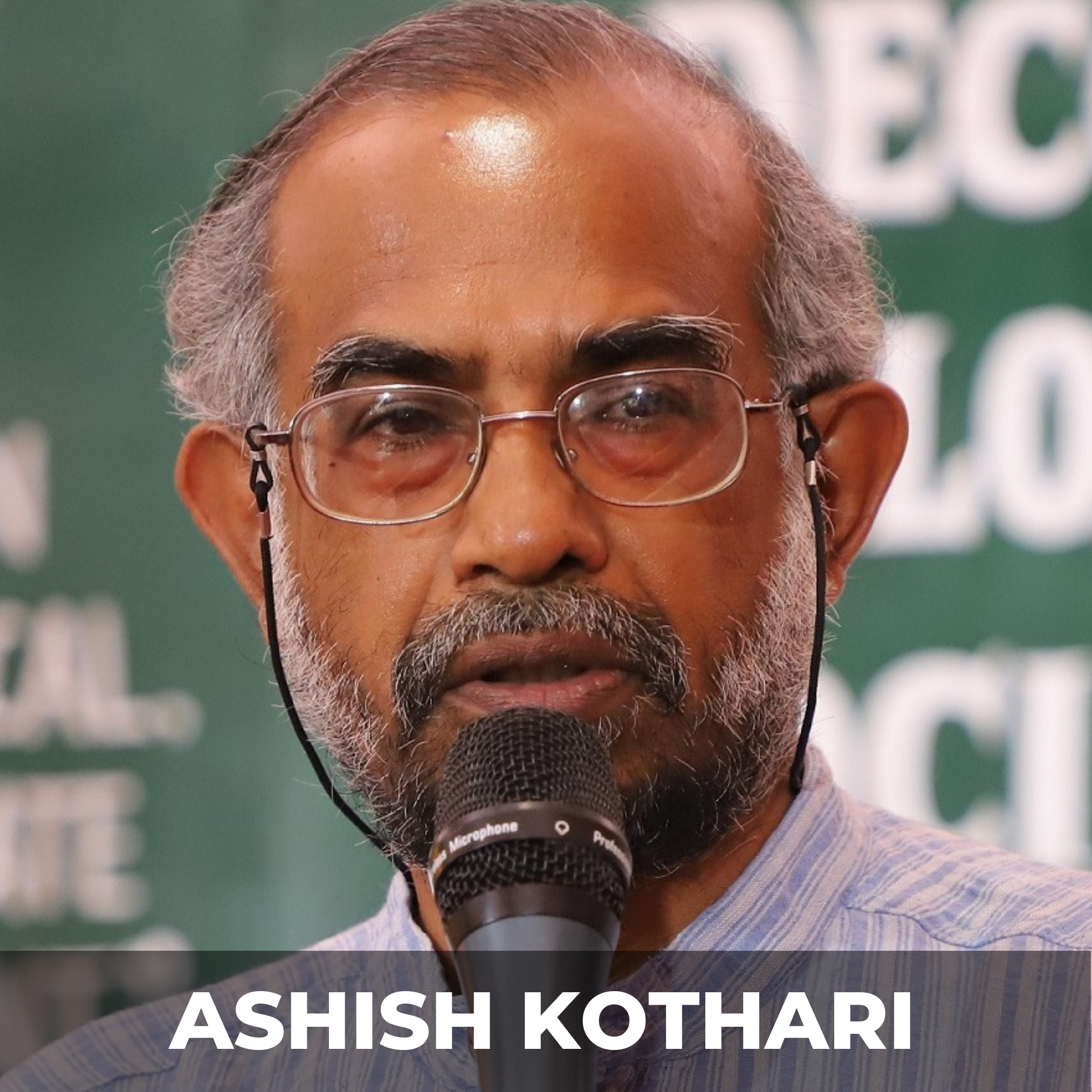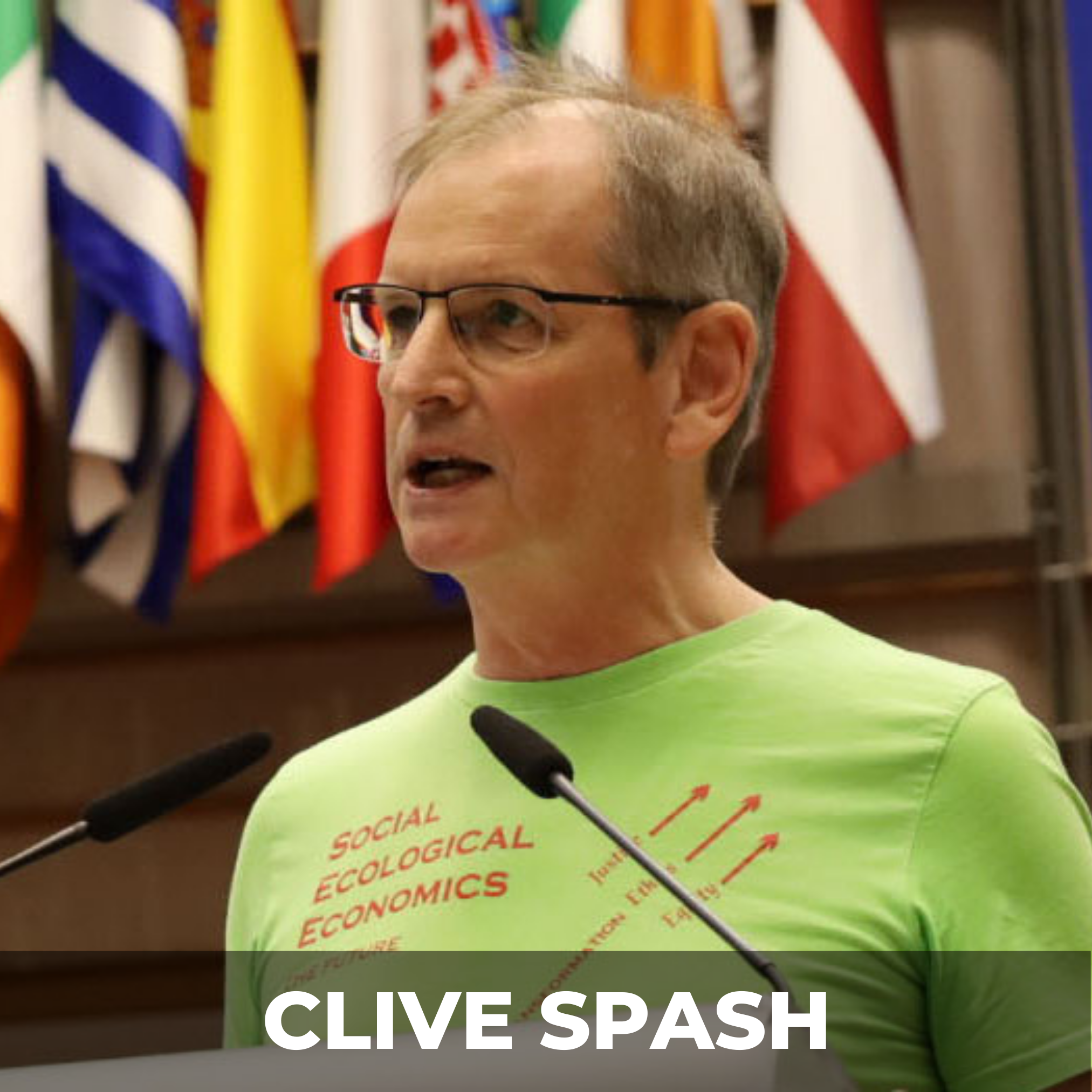The Poverty of Growth
Obsession with growth is enriching elites and killing the planet. That’s the message of this week’s guest, Olivier De Schutter, UN Special Rapporteur on extreme poverty and human rights and author of The Poverty of Growth. Highlights include:
Why poverty is about more than low income and how unequal economic growth creates greater social exclusion and status anxiety for the majority of people that growth leaves behind;
How global trade practices benefit corporations over workers, especially in low-income countries, driving inequality and limiting worker protections;
Why ‘green growth’ is a myth and that economic growth continues to be tied to both resource depletion and environmental damage;
How the commodification of life drives consumption and inequality, with more services that were once free or communal now privatized, creating a need for income rather than creating greater wellbeing;
How adopting norms of sufficiency could shift economies to focus on collective wellbeing and fair resource distribution over perpetual growth.
MENTIONED IN THIS EPISODE:
-
Olivier De Schutter 0:00
I think that growth in the way it has been pursued has been extractive and exploitative. It's been extracting resources from the global south to feed the development process of global north, and it's been exploitative in the sense that it has been premised on least qualified workers being paid low wages in order to increase the profit margins of corporations, allowing the shareholders to pocket the dividends. And that type of growth, although it may create wealth in the purely accounting sense of the expression, is certainly not increasing wellbeing, and certainly not conducive to reducing inequalities.
Alan Ware 0:42
Our guest in this episode of the Overpopulation Podcast is Olivier De Schutter, UN Special Rapporteur on extreme poverty and human rights and author of The Poverty of Growth. Olivier unpacks how the dominant culture's obsession with growth is enriching elites and killing the planet, and why ending poverty and environmental catastrophe demands fresh thinking.
Nandita Bajaj 1:12
Welcome to the Overpopulation Podcast, where we tirelessly make ecological overshoot and overpopulation common knowledge. That's the first step in right-sizing the scale of our human footprint, so that it is in balance with life on Earth, enabling all species to thrive. I'm Nandita Bajaj, co-host of the podcast and executive director of Population Balance.
Alan Ware 1:35
I'm Alan Ware, co-host of the podcast and researcher with Population Balance. We are proud to be the first and only nonprofit organization globally that draws the connections between pronatalism, human supremacy, social inequalities, and ecological overshoot. Our mission at Population Balance is to inspire narrative, behavioral, and system change that shrinks our human impact and elevates the rights and wellbeing of people, animals, and the planet. And now on to today's guest. Olivier De Schutter is the UN Special Rapporteur on Extreme Poverty and Human Rights. An academic specialized in economic and social rights, he was the UN Special Rapporteur on The Right to Food from 2008 to 2014 and a member of the Committee on Economic, Social, and Cultural Rights between 2015 and 2020. Prior to those appointments, he was Secretary General of the International Federation for Human Rights, and he teaches at UC Louvain Belgium and at Sciences Po in France. And now on to today's interview.
Nandita Bajaj 2:40
Welcome Olivier. It's really great to have you with us today.
Olivier De Schutter 2:43
My pleasure entirely. Thank you.
Nandita Bajaj 2:47
And Olivier, you came to our attention earlier this summer with the publication of your groundbreaking report to the United Nations Human Rights Council titled Eradicating Poverty Beyond Growth. And this report, which was inspired by your new book, The Poverty of Growth, questions the assumption that economic growth should be a primary goal of our socioeconomic system, and that you've argued instead for a human rights-centered economics that is, of course, totally aligned with our work at Population Balance. And we are excited to dig into your important insights today. And also seeing your close connection with the UN for many years in different capacities, we are especially pleased that you are bringing this much needed discourse within the UN. So we'll begin with your new book, The Poverty of Growth. And you mentioned at the outset of your book that one of your objectives is to help the reader distinguish between different understandings of poverty. What do you think most people need to better understand when we think about poverty?
Olivier De Schutter 3:55
Indeed, I think poverty is usually the pretext for continuing growth as usual. The reduction of poverty is the reason why we are pursuing growth with such zeal. And it's important to realize that poverty is not something that can be simply reduced to having basic needs satisfied, by being able to have a roof above one's head, or to be able to put food on the table, although that is, of course, hugely important and a precondition for a dignified life. Many people in poverty, even though they may manage to meet those essential basic needs, they will feel socially excluded because of the widening gaps between those who have more and those who have less. So poverty should not be seen in absolute terms as deprivations that affect people's ability to survive. Poverty should be seen in relative terms as social exclusion resulting from widening inequalities, and that is what we have seen in many parts of the world. Over the past 40 years absolute poverty has been reduced at the same time that relative poverty - social exclusion resulting from the fact that you have less than others and you cannot basically compete with the way they consume - has increased at the same time.
Nandita Bajaj 5:16
Right. And you talk about multidimensional poverty, right, that results from this kind of social exclusion that goes beyond these absolute numbers that nation states are often very focused on. Can you say a little bit more on some of these different types of poverty?
Olivier De Schutter 5:36
Well, the idea of multi-dimensional poverty emerged in the early 1990s initially with the Human Development Index pioneered by the United Nations Development Program that looked not only at monetary income as a measure of poverty, but also looked at issues such as health, nutrition measured by life expectancy, access to education. And they developed a series of indicators that now are used and refined and defined in various ways for different countries. What's interesting here is that you do not reduce poverty to how much revenue people have. And it may well be that although your monetary income will be relatively low, you will nevertheless be able to enjoy a dignified life, because many services or goods will be provided for free or at highly subsidized rates by the state. So you will have free access to education, free access to healthcare. You will have heavily subsidized access to housing, for example, allowing you to do much more even though you have less income. Conversely, you may be in a society where your income will be good, but you will have huge difficulties meeting the necessities of a dignified life because everything is very expensive and commodified. And in such a society, even though you may be monetarily wealthy, you will be excluded from certain goods or services that are essential simply because they are not subsidized by the state. So clearly, multi-dimensional measures of poverty were an important improvement from the purely monetary measures of poverty, but they still do not take into account the fact that people may be socially excluded, may feel humiliated and discriminated against because they cannot match the social expectations of societies where most people are richer than they are themselves.
Alan Ware 7:40
Right. And as you write in the book, the focus has been on this absolute poverty, or kind of just a purely money calculus of poverty. And you've written the dominant approach to fighting poverty historically has been to rely on increasing the output of the economy, the GDP, and then redistributing that growth through taxes on the rich to pay for goods and services for the poor. And we'll get more into your critique of economic growth as the primary reduction strategy shortly. But first, how did that whole focus on GDP growth become so prominent, and why do you think it continues despite all these weaknesses we've discussed?
Olivier De Schutter 8:15
Well, the focus on GDP growth is a relatively recent phenomenon. The measure, the indicator of GDP, emerged in the early 1930s when Franklin Delano Roosevelt requested from Simon Kuznets, who was a highly respected economist, to define how the growth of the US economy could be measured in order to assess whether the US were recovering from the major economic crisis that started in October 1929 with the crash of Wall Street. And Simon Kuznets developed this measure, which essentially sought to measure all that was produced or consumed by an economy within a specific period of time, typically one year. And that measure of progress became dominant in the Second World War and later it was an easy-to-use indicator of progress. It was linked to the idea that we could, year after year, improve on what the output of the economy was.
And at the time, in the 1940s and 50s, when that measure of progress became predominant, there was no real awareness that we were depending on resources to be extracted from the planet, and that the ecosystems had to absorb pollution and waste resulting from the economic activity. There was no realization that there were planetary boundaries that we could not afford to exceed, and that awareness only started in the 1970s when the idea of infinite growth was initially questioned. But that is just when infinite growth was becoming unavoidable in a context characterized by the major economic crisis that started with the oil crisis of 1973. When the crisis hit, rich economies decided that growth was necessary to increase public revenue, allowing to pay unemployment benefits to those affected by the crisis, and growth was necessary to create the jobs that the economic crisis had been destroying. And so just at the same time that GDP growth was criticized for not taking into account environmental boundaries it became indispensable for rich economies to grow further in order for them to keep the balance.
Nandita Bajaj 10:41
Right, right. And, as you note in your book, so much of that continued growth was misguided because of the extractive principles embodied in colonialism and western imperialism, through which a lot of rich countries became richer by exploiting people, the ecosystems, the land and the water in poorer countries. There was a lot of inequity built into this kind of growth model. Why do you believe that the continued focus on economic growth as the primary poverty reduction strategy is misguided?
Olivier De Schutter 11:18
The primary way by which we are trying to reduce poverty since the Second World War has been in a three step sequence. You grow the economy, you tax income from corporations and wealthiest households, and then you redistribute - financing public services and social protection. And that is the most common way by which poverty reduction efforts can be described. The problem, however, is that in the name of pursuing growth, in the name of creating incentives for the economy to grow, we are led to make a number of policy choices that end up being counterproductive.
For example, we flexibilize labor markets, diminishing workers rights in order to attract investors and encourage companies to make investments to create jobs. We lower taxes on corporations in order to create a business-friendly investment climate. We liberalize trade in order to encourage the most competitive sectors of the economy to grow and thus to hopefully create jobs. And all these policies are actually weakening the bargaining power of the least qualified workers, making it much more difficult to achieve equal societies in which revenues are fairly distributed across different income groups. And we create enormous pressure on workers to improve their productivity at the expense of what has become today a global burnout epidemic. And so that is what we find. It is that this obsession with growth - this obsession with growing the GDP as a precondition for everything else - is actually becoming counterproductive.
Nandita Bajaj 13:02
And as you pointed out in your report, in the past four years alone, the world's five richest men have more than doubled their fortunes, while nearly 5 billion people have been made poorer. And more than half of the world's population has no access whatsoever to some of the social protections that you're talking about that this kind of trickle down economy doesn't really support, especially with these liberalization types of policies, that continues to just look at the interests of corporations and the elites.
Olivier De Schutter 13:37
Another issue related to this obsessive quest for growth has, of course, to do with the environmental consequences thereof. In the UN, since 1992 and the Earth Summit in Rio, there is this belief that growth can be achieved without worsening our ecological footprint. That is the idea of green growth. And actually, we realize more and more that that is a myth. Some countries, the richest countries, may be able in the past few years, some have succeeded in doing this, to grow the economy whilst reducing greenhouse gas emissions by shifting to services rather than the industry, by adopting greener technologies that reduce the amount of pollution created and so on. But not only has this been achieved only by a limited number of high income countries that have a very high rate of greenhouse gas emissions per capita. But in addition, that doesn't take into account resource extraction, in other terms, the materials that we use in order to grow the economy. And it doesn't take into account other forms of waste and pollution beyond greenhouse gas emissions. Nor does it take into account the loss of biodiversity that growth entails. In other terms, absolute decoupling of growth from environmental impacts is actually a myth. It does not work. It never happened.
The only occasions when countries have actually reduced their environmental impact is when there was a major recession. And, of course, no one wants a recession. A recession is something that is imposed on an economy as a result of a crisis that can be endogenous within an economy or the result of an external shock. No one wants a recession, but postgrowthism is not calling for a recession. It's calling for a democratically managed transition to something else, in which you choose what to grow and what not to grow, what to shrink, based on considerations of social justice and environmental sustainability. Whereas an economic recession, such as that that affected Greece in the years 2010-2013 or that has affected Venezuela over the past 10 years, that is something that is not planned, that is not democratically managed, and where you do not know what will shrink and what will instead increase, and it can be hugely damaging to the population.
Alan Ware 16:21
Right. And as degrowth advocates on the podcast have noted, we would ideally contract the human enterprise in a planned, reasonable, more equitable way, and not a chaotic, inequitable way that an economic recession or even depression would create. And we've seen, as you've also mentioned, growth is not serving the developed economies very well. You've mentioned that it's led to a kind of obesity, physically, and mentally we've seen the rise of depression and anxiety. We haven't seen a rise for the majority of people in developed countries with GDP growth, because, as you mentioned, most of that growth is going to a global few percent anyway. And as you mentioned in the book, since the oil crisis of the 1970s growth has been faltering, and that economic stagnation as that was threatening,beginning in the 1970s the neoliberalism helped open up the world for capital. It helped open up the world for the richest. And then the fall of the Soviet Union just kind of put that on steroids, even more neoliberalism.
And in addition to the opening up of the world to capital after the Soviet Union dissolution, we've also experienced that economic growth is being boosted by more and more debt around the world. And many countries in the industrialized world, including the US and Europe and Japan, depend on debt to keep economic growth or the semblance of it alive, and they also depend on population growth to maintain economic growth. And yet, even though it's failing developed economies, it still remains the primary goal. And as you've mentioned, the wealthiest view economic growth and enlarging the pie as the easiest way, politically, to not have to redistribute wealth. And to the extent the population growth has been seen as integral to economic growth, we're seeing increasing panic now among developed countries about any small absolute population decline. It's being treated as a near disaster in many of these countries. So we're very encouraged by your questioning of the ability of growth in developed economies to deliver for the people in general, and the push that that has created for population growth to continue also.
Olivier De Schutter 18:31
Well, I think part of the measures we have of GDP growth is also quite misleading, because part of this is the result of certain services, that in the past were provided through the commons, becoming privatized. So in that sense, GDP growth sometimes is just the result of the fact that monetary wealth increases without wellbeing improving at all. In fact, when the commons become privatized, when resources that were available for free for people become resources they have to pay for, so that access to these resources depend on the ability to pay, that means that the wellbeing of people will be diminished, that inequalities will increase and poverty will increase. All this despite the indicator of GDP improving in the eyes of the governments, because more monetary wealth will be created year after year as a result of these processes. So part of the problem about the discussion concerning GDP is that it measures wrong things. It measures basically the monetary wealth created by the economy during a certain period of time when what we should measure really is wellbeing, equity, and the ability for people to thrive, to enjoy healthy and decent lives, and that is not adequately captured by the measure of GDP.
Alan Ware 20:03
Yeah, you make a point in the book of talking about the commodification of life, which seems to arise from time-starved people who then have to pay people to do their laundry and their cooking and their cleaning. And they have no ability to entertain themselves, so they spend a lot for entertainment. And you're creating a lot of the personal branding, the marketing that individuals now feel you have to do to make it in the modern world. So I appreciated you talking about the commodification of life and how that puts everything into the marketplace. It puts everything into GDP, and leaves so little outside of it, and yet it can be an indication of an impoverished life. And over the past several decades, global trade has been a major driver of economic growth. And as you note in the book, this globalization has prioritized efficiency over social equity and ecological sustainability. Who do you think has been most harmed by that system, the current system of global trade?
Olivier De Schutter 21:02
Well, trade started to be liberalized, especially in the 1980s and then it was accelerated when the World Trade Organization was established in 1994. Of course, the fact that China joined the WTO in 2000 further increased the pressures from globalization. And what it meant was, first of all, that the least qualified workers in rich countries were marginalized, feeling redundant, feeling threatened by the threat of employers that they would outsource production to low wage jurisdictions. So that is one of the major reasons why authors such as Anne Case and Angus Deaton identify that some parts of the US population are now losing life expectancy. The less qualified workers, the working class in the US, especially amongst the whites, have witnessed a reduced life expectancy over the past 25-30 years, largely because they have lifestyles that betray a sense of redundancy. They feel excluded, marginalized, and they therefore drink too much alcohol, they consume opioids, they commit suicides in higher numbers than in the past. And it's particularly those blue collar workers marginalized by globalization that are affected.
In the global south the globalization of trade means something very different. It may create opportunities for some, but it puts pressure on workers to not demand too much in terms of higher wages. Why? Because in many global supply chains, the comparative advantage of the country, the competitiveness of the country, will depend on those wages being kept relatively low, because that is where the country's comparative advantage resides. And so, in a way, it results in a situation in which the demands of unions and workers to enjoy pay rises will be countered by the arguments that that might result in the loss of certain clients and markets. I was in Bangladesh in May, 2023 on a mission for the UN, and I was really struck by the reluctance of the governments to allow wages in the garment sector in Bangladesh, the vast majority of whom are women, to raise wages, because they told me, Well, the big buyers in this sector will simply shift to Myanmar, Burma if we raise wages in in Bangladesh. So basically, unions, both in the north and in the south, have a weaker bargaining position as regards wages in particular but also other labor conditions resulting from this globalized competition.
Alan Ware 24:00
Right. Yeah, the organization of labor centralizing itself to push back against centralized capital. I like in the book, also how you mentioned that, I hadn't quite thought of it to this extent although it is common sense, but that large buyers and suppliers of global south products want to work with large retailers, large sellers, right? So they don't want to work with all of these small farmers in Congo or wherever. They want to work with one massive seller. So that just biases everything towards large capital, right?
Olivier De Schutter 24:34
Globalization is a system in which bigness is a competitive advantage as such, the larger you are, the more dominant you are on a market, the more the sellers will be dependent on you buying from them, and the easier it will be for you to impose on those sellers conditions that they will have no choice but to comply with. And so the dominant buyers can further increase their dominance because of these conditions, allowing these buyers to buy at a relatively low price and sell, therefore, at a relatively low cost to the end client or consumer. And so the system is one in which the bigger you are, the more dominant you can become. And it leads to gradually monopolies forming in global supply chains.
Alan Ware 25:28
And you've argued for greater south-south trade, instead of having the global north extract so much of the resources of the global south. Are you seeing some indications that that's happening or potential for the greater south-south trade?
Olivier De Schutter 25:42
Well, one of the major difficulties we encounter in this discussion on how we can move beyond the hegemony of growth is that rich countries, although they should become stationary economies and they should stop being obsessed with growing further, if they do not continue to grow, the development of countries from the global south that depends on the ability for those countries to sell to the high value markets of the OECD will be delayed or even interrupted. We saw this very clearly during the COVID 19 pandemic. Although that crisis hit all countries in the world, it was the south countries that were the most affected, because exports, for a moment, ceased, and remittances were reduced from migrant workers that those countries benefited from, and these countries were negatively impacted by the interruption of trade. And so what we need to do is gradually avoid the development of low income countries having to depend on rich countries growing even more that is just not sustainable, because rich countries have already completely exploded planetary boundaries. The additional growth they can create will not make people happier. Instead, it will make people more stressed and less healthy. But of course, we have to allow low income countries to continue to develop their economy and to invest in infrastructures and and the wellbeing of their population. And to do this,we need to create local, regional markets and avoid the development of those countries depending on their ability to export. That's a long-term objective. It will not happen overnight. It requires maybe 10-12years for trade to be redirected. But I do think this is the direction in which we should go.
Nandita Bajaj 27:39
And as you point out, this monopolization from globalized trade of these big multinational corporations is truly actually built on a history of colonialism where the power is shifting away from necessarily imperial powers to these big multinational corporations. And we spoke recently to an environmental activist in India, Ashish Kothari, who is trying to do some of what you're recommending in reclaiming some of the traditional knowledge systems and practices that were based on these small scale pastoralists and farmers and artisan workers, so that they don't necessarily have to assume the values that the global north is trying to export to the global south, and saying, Well, this is how development should look like. So many communities know what it means to have secure sufficiency. They know what it means to live well within, you know, means. And so economic growth kind of has been exported as this global model of prosperity. And we appreciate that you're really questioning it and also just preventing it from further indoctrinating some of the communities that have done just fine without relying on economic growth as their main goal.
Olivier De Schutter 29:06
Well, globalization is a process that is not only technological based on the reduced costs of communication and transport. It's not only a legal or economic phenomenon, the liberalization of trade and investment allowing global competition to emerge. It's also a cultural phenomenon, and today we have countries with very large population - China, India, Indonesia, the Philippines, many others - whose lifestyles increasingly mimic those in affluent countries. And that is what commentators call the 'middle class effect'. Once a country reaches a certain level of income per capita, roughly around 7,000-8,000 dollars per year per person, that country's middle class aspires to having very much the same lifestyle as those that are common in Western Europe, Canada, or the United States. And one can understand this desire to travel by plane, have all the household appliances that households in affluent West may possess and so forth. But it is entirely unsustainable, and we need, therefore, to value something else than the acquisition of such consumer items and these lifestyles, and we have to put much more value and praise to lifestyles that are much more sober and economical in the resources that they use. So there's also a cultural battle there, which is, which are the norms that should guide future consumption patterns, and what is the definition that people will have of what it means to be, tobe happy, to live in, in felicity. And certainly, it is problematic that the lifestyles of the affluent West that are so destructive have gradually become the norm.
Nandita Bajaj 31:16
Totally. In fact, so much of the new research is showing that the growth in the middle class is now happening most quickly within Asia. That's where a lot of the people are now aspiring to this global north type of living. But it's not that it's somehow happening within a social justice framework, because within those countries, like one of our guests pointed out, today's India is the most unequal it's ever been, where the top 1% of the people own 60 to 65% of the wealth. And all this privatization, as you spoke about, of education, of healthcare, is further disempowering the most impoverished people who don't have a say in how to access these most basic services that really should be common goods for everyone.
Olivier De Schutter 32:10
Indeed, growth today is not in the interest of low income households. It's not even in the interest of the global south. And I was really surprised and favorably surprised by the fact that when I presented my report to the Human Rights Council in Geneva in July 2024 the response of developing countries was actually quite encouraging. These countries today understand that growth in the way it has been pursued so far has been extractive and exploitative. It's been extracting resources from the global south to feed the development process of global north, and it's been exploitative in the sense that it has been premised on least qualified workers being paid low wages in order to increase the profit margins of corporations, allowing the shareholders to pocket the dividends. And that type of growth is one that, although it may create wealth in the purely accounting sense of the expression, is certainly not increasing wellbeing and certainly not conducive to reducing inequalities. And the case of many South Asian countries is indeed a case in point.
Nandita Bajaj 33:27
And as you can see, why this drive for cheap labor also is creating, as Alan pointed out earlier, this panic that fertility is declining in some countries because of greater gender equality. But you can see for the elite class that depends on a larger precariat class, it is beneficial to continue to have expanding populations in poorer countries so that they remain disempowered. And I recently shared with you a paper that my colleagues and I had co-authored titled "Confronting the UN's Pro-Growth Agenda", in which you see this kind of unquestioned commitment to economic growth, as you see in the Sustainable Development Goals. Sadly, the UN seems strongly committed to this notion that you can fight poverty with economic growth. So many of these UN agencies dismiss any concern around population growth, and meanwhile, more and more research is showing that, especially in Africa and South Asia, rapid population growth is still a major contributor to rising extreme poverty.
Olivier De Schutter 34:36
Well, population growth has been, historically, very much a pretext for pursuing growth at all costs, right? The idea was, given that the population is expanding, we need to create more jobs. We need to cater to the needs of more people, and thus we need to create growth. I would say that even when demographic growth was strong, we should have been much more subtle and wiser in choosing what kind of economy we want. It's not because an economy grows that everyone will benefit, and it's not because an economy does not grow that everyone will find themselves worse off. In fact, we have to democratize the choice as to the direction in which the economy should develop, and the GDP indicator is a very weak indicator of whether or not it benefits the people.
Alan Ware 35:30
Yeah, as you mentioned earlier, the faith in technology, that technology will continue to deliver growth and a greener environment, is very problematic. And you talk about the substitution effects, that we have a rebound in consumption. When we decrease our use of oil, that may allow somebody across the world to use it, which can be fine in a justice sense, but the overall amount of oil still increases, or the revenue effects, which I hadn't heard that term before, but the money you save from the cheaper oil, then you go and do something else. You buy something else with it. And the 'middle class effect' that you talked about, that people start emulating the higher levels of consumption at a certain level. And then 'lock-in' you mention, which is the infrastructure, all these roads and airports and bridges and everything we've built, and we've spent trillions investing in it, and it's very hard to let it go, to just let it decay through entropy. There's a feeling we have to maintain all of that. So that's all kind of in service to growth, this belief in efficiency and technology, and I think you rightly criticize and show that it just hasn't happened. That as we've increased GDP, it's roughly 100% linked to material consumption, I think, and energy is nearly 99% linked with GDP growth. So we can't get rid of the physicality of GDP growth. But you've argued in the book a lot, moving from the norms of kind of overconsumption to a world of a norm of sufficiency. How do you paint that norm of sufficiency? What would that look like?
Olivier De Schutter 37:06
Well, let me make three comments on this. First of all, technologies can be very helpful in allowing us to overcome certain challenges. But apart from the fact that they do consume energy and and material, technologies may often disappoint in so far as they result in certain rebound effects, some of which Alan you described. In other terms, although they may lead to efficiency gains, these efficiency gains may be entirely annulled by the fact that, if you save money, for example, because you have a more efficient car, you may spend the money on something else and thus increase your ecological footprint. Or you may be tempted to drive longer distances, given that your car will pollute less. So these rebound effects really cancel out many of the efficiency gains we expect from the introduction of better cleaner technologies. Therefore there is no choice but to go beyond technological innovations and also pursue certain social innovations, in other terms, lifestyle changes that will be much more sustainable.
And these lifestyle changes are essentially guided by social norms that we should encourage and that can be to a certain extent, manipulated. In other terms, they can be engineered with the right set of tools. The problem is that in societies that are relatively unequal, the status anxiety that follows, the fear that people have, that they may fall behind on the social ladder, will lead them to try to mimic the consumption style of the richest part of the population. And this is what already more than a century ago, Thorsten Veblen, the economist who invented the term conspicuous consumption, had described. You will consume in order to imitate what the rich are doing because you want not to be looked down upon. And thus the more unequal a society is, the more people will try to increase their level of consumption to rival with the rich. And that problem of status anxiety and of overconsumption resulting from the anxiety of falling behind, that problem is much less present in more equal societies.
Alan Ware 39:34
And I like in the book how you talk about low income households are the real experts in how to economize and how to have those norms of sufficiency. And it made me think of some of the folk wisdom and cultures even in the US not many generations ago - use it, repair it, do without. You know, there was much more of a sense of not wasting, like not wasting food.
Olivier De Schutter 39:57
Yes, I think valuing the knowledge of people living on very low incomes, but who are very good at sharing, supporting each other, at repairing, at reusing, is important. It's important not simply because it's a very useful way to think about the circular economy beyond the techno fixes. It's also important to value that knowledge as expert knowledge that we can build upon. And one of the current complaints, or frequently heard complaints, of people in poverty is that their experience is undervalued.They are not listened to, and although they have lots to say, they are not taken seriously by many policy makers. Yet, I think that their experience can be extremely valuable in identifying certain social innovations that could help us overcome the ecological crisis.
Nandita Bajaj 40:53
Yeah, instead of continuing to indoctrinate and wiping out more of the traditional knowledge systems and practices that have been displaced with so much of this kind of 'middle class effect' and this idealization of the global north ideals, it would be worth preserving whatever is left of these traditional communities and really turning to them for, as you say, some of the expert knowledge and wisdom to understand how to move forward toward a more ecological civilization that's also much more socially democratic and prioritizes wellbeing. So you've talked a lot about democratizing the economy and the benefit of that. If you can talk about what are some of the top most priorities that you believe need to emerge in moving from this profit-driven economy to a more human rights economy that prioritizes some of these social, wellbeing values rather than materialistic values.
Olivier De Schutter 42:01
Indeed, I think a major problem is that whereas we have insisted on democratizing the state and holding governments accountable to people through elections, we have failed to democratize the economy. Yet most of our daily lives are essentially the result of choices made by economic actors who are entirely unaccountable and in conditions that do not allow for any transparency in the choices that are made that do not have to be justified. And I think democratizing the economy is indeed therefore very important, because the economy essentially will otherwise continue to serve the needs of the rich, respond to demand expressed by the purchasing power of the rich, rather than meet the needs of people in poverty. So democratizing the economy means ensuring that the economy serves the purpose of improving the wellbeing, particularly of those who are worse off, and ensuring that the benefits of the economy will be equitably shared across all groups of society. Unless we democratize the economy, this will not happen.
Democratizing the economy means, for example, involving workers' representatives in the strategic choices made by corporations. It means developing the social and solidarity economy, the network of cooperatives and social enterprises that should be much more supported in the future, and should gradually become a strong alternative to the mainstream economy that works for the primary interests of maximizing shareholder value.
We need economies that value much more care. And one of the problems with the current emphasis on GDP growth is that all the work that is largely unrecognized and unremunerated, performed mostly by women within households and communities, is not valued, supported in any way. And I believe there are ways in which it could be valued much, much better, for example, by expanding parental leave, by reducing working time, by providing much more support to childcare services and services going to the older persons who cannot care for themselves. We could do much more to ensure that people have more balanced lives, and that those functions of people providing care are better supported and rewarded. And part of this goes to how much they are paid. I was really struck to find in a report I did on the working poor that the essential functions performed by people working in the healthcare or educational sectors were underpaid in comparison to, for example, what private bankers make or what traders make. And yet, providing support to families or to the elderly is super important for healthy societies. But the problem is, of course, the people who benefit from those services don't have the purchasing power allowing them to pay high wages to the helpers. But that is deeply unjust, and a society that wants to truly value care work should pay care workers much better.
Nandita Bajaj 45:30
Well, we know you are tight for time, so we will wrap this conversation up now. But we want to thank you so much for this groundbreaking work that you are doing in helping to shift our collective focus, especially of dominant cultures, away from this obsession with growth and how you are bringing this important conversation into institutions like the UN. Thank you very much for your time today. We really appreciate it.
Olivier De Schutter 45:57
Thank you. It was my pleasure entirely.
Alan Ware 45:59
That's all for this edition of the Overpopulation Podcast. Visit populationbalance.org to learn more. To share feedback or guest recommendations, write to us using the contact form on our site or by emailing us at podcast@populationbalance.org. If you enjoyed this podcast, please rate us on your favorite podcast platform and share it widely. We couldn't do this work without the support of listeners like you, and we hope you'll consider a one-time or recurring donation.
Nandita Bajaj 46:27
Until next time, I'm Nandita Bajaj, thanking you for your interest in our work and for your efforts in helping us all shrink toward abundance.











